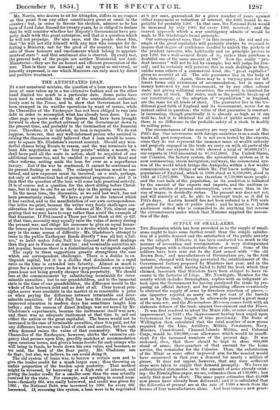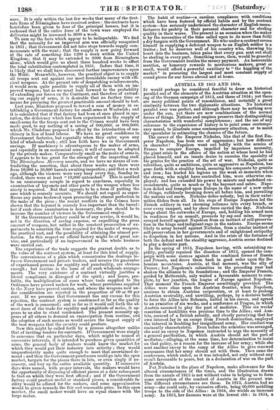SUPPLY OF SMALL-ARMS.
THE discussion which has been provoked as to the supply of smallarms ought to have some farther result than the simple satisfaction of a public demand and the satisfaction of the public anxiety on the subject. Hitherto it has been conducted too much in the manner of accusation and recrimination. A very distinguished journal began with a characteristic force of accusal. Some of the soldiers have been sent out to the East armed with "the old Brown Bess, and manufacturers of Birmingham are, in the first instance, charged with having prevented the establishment of the Government factory proposed by Ministers last year, and in the second instance, with having failed to fulfil the work which they claimed, insomuch that Ministers have been obliged to have recourse to the factories of Liege. Mr. Newdegate, Member for the county which includes Birmingham, replies with an indignant attack upon the Government for having paralyzed the trade by proposing an official factory, and for permitting officers vexatiously to obstruct the supply of arms by frivolous rejection of pieces,— one inspector rejected as many as 80 per cent of the barrels sent in by the trade, though he afterwards passed a great many of the same set; and the Birminyham Mercury comes forth with an elaborate defence of the trade against Government and the Times..
It was first resolved to adopt the Minie rifle, or some equivalent improvement, in 1851; the improvement having been urged upon Government for some length of time previously. The Duke of Wellington then calculated that the total number of new pieces required for the Line, Artillery, Militia, Pensioners, Navy, Marines, Coast-Guard, Channel-Islands Militia, and Colonial Corps, would be 350,000,—an allowance which would be insufficient for the increased numbers of the present day. It was reckoned, then, that there should be kept in store 600,000 stand of arms ; three-quarters of that amount for the home service, the remainder for the Colonies. Thus, the substitution of the Minie or some other improved arm for the musket would have occasioned in that year a demand for nearly a million of pieces. It does not appear, however, that any very sufficient steps were taken to supply that demand promptly. We have no authenticated statements as to the amount of arms already existing : the Birmingham paper, we see, estimates them at 150,000; but surely that must be short. The same paper estimates that 45,000 new pieces have already been delivered ; and it is calculated that the deliveries at present are at the rate of 1100 a week from the houses of four manufacturers alone. And here comes a new griev.
ance. It is only within the last few weeks that many of the firstrate Arms of Birmingham have received orders : the contracts have heretofore been given to four of the principal houses, but it is reckoned that if the entire force of the town were employed the deliveries might be increased to 3000 a week. TO slim up the facts which appear to be indisputable. We find that the necessity for an improved arm was officially recognized in 1.851; that Government did not take steps towards supply commensurate with the want ; that the supply is now going forward at the rate of something like 1200 a week within the United Kingdom; that it may be extended to 3000 from Birmingham alone, which would give us about three hundred weeks to effect the total Substitution contemplated in 1851. Before that time, it is likely that we shall have discovered further improvements upon the Mime. Meanwhile, however, the practical object is to supply all troops sent out against our most formidable enemy with efficient weapons. At the present rate of despatching reinforcements, it would seem quite possible to supply all of them with an improved weapon; but as we must look forward to the probability of extending our forces on the Continent, and therefore of extending our supply of arms, it is desirable that no further time or means for procuring the greatest practicable amount should be lost. Last year, Ministers proposed to invest a sum of money in es
tablishing a Government factory for small-arms at Woolwich; and it is calculated that if that factory had been at once placed in operation, the deficiency which has been experienced in the supply of small-arms for the troops sent out to the Crimea would have been made good, to say nothing of a saving of 800,0001. or 900,000/. which -Mr. Gladstone proposed to effect by the introduction of machinery in lieu of hand labour. We have no great confidence in Government factories, but especially when they enter upon any kind of wholesale work ; still less faith have we in Government savings. If machinery is advantageous to the maker of arms, and especially in an economical sense, it will of course be adopted by the private maker. Comparatively small as the make of arms is it appears to be too great for the strength of the inspecting staff. The Birnzinpham Mercury asserts, and we have no means of contradicting the assertion, that about three weeks ago there were from 10,000 to 20,000 barrels awaiting inspection ; and that a week ago, although the viewers were very busy every day, Sunday included, there were at least "10,000 untouched." This is ascribed to an unnecessary scruple in regard to exactness, especially in examination of bayonets and other parts of the weapon where less nicety is required. But that appears to be a form of putting the ease which is scarcely accurate. We should not regard as superfluous any pains bestowed upon procuring the utmost perfection in the make of the piece; • the recent conflicts in the Crimea have shown that the bayonet is scarcely less important than the barrel : but if such close examination is necessary, the plan should be to increase the number of viewers in the Government employ.
If the Government factory could be of any service, it would be, not in the direction of saving expense, or expediting the gross amount of weapons, but rather in the constant prosecution of experiments to ascertain the time required for the make of weapons, the practical cost, and the possibility of attaining the utmost perfection. In this respect an official factory might be of great service, and particularly if an improvement in the whole business were carried out.
The experience of the trade suggests the gravest doubts as to the value of the contract system, at least for this kind of supply. The conveniences of a plan which concentrates the dealings between Government and private traders, and secures the guarantee of experienced persons for rapidity and punctuality, are obvious enough ; but routine is the bane of all such wholesale arrangements. The very existence of a contract virtually justifies a literal compliance in disregard of the spirit ; and hence, probably, the multiplication of cases where tools supplied to the Ordnance have proved useless for work, where provisions supplied to the Navy have proved carrion, and where the weapons now under consideration are rejected in the proportion of 60 or 80 per cent. If we presume that Government has any excuse for this rejection, the contract system is condemned so far as the quality of the work is concerned ; and so far as it would call forth the utmost force of the trade for rapidity and amplitude of make, it appears to us also to stand condemned. The present necessity appears of all others to demand an emancipation from routine, and the adoption of such means as would secure the largest supply of the best weapons that the conntry could produce.
Now this might be called forth by a process altogether unlike that of inviting tenders for contracts. If Government were simply to announce that on particular days, which might be named at successive intervals, it is intended to purchase given quantities of arms, the general body of makers would know the market for which they would put their industry into activity ; they would unquestionably make quite enough to meet that ascertained demand; and then the Government purchasers could go into the open market, bargain for the pieces there in lots, or even singly if necessary, and buy up the entire available quantity. If successive days were named, with proper intervals, the makers would have the opportunity of disposing of efficient pieces at a date subsequent to that on which they were first offered ; and if the Government factory could produce model or standard pieces, a considerable facility would be offered for the makers, and some approximation would be given towards the fair and reasonable price. In this open market, the small maker would have an equal chance with the large maker.
The habit of routine—a careless compliance with conditions which have been fostered by official habits and by the contract system—has seriously undermined the character of English manufacturers for probity in their personal character and for sterling quality in their wares. The present is an occasioirwhenthe maker 18 by the necessities of the time called upon to do more than fulfil a dry bargain with the Government. He who under a contract covers himself in supplying a deficient weapon to an English soldier is a traitor ; but he deserves well of his country who, throwing his heart into the business, takes pains that every gun sent out shall be sterling in every part. Something more, then would be graoeful from the Government besides the money payment. An honourable mention, or honorary rewards to meritorious makers, great or small, would afford a powerful auxiliary to "the higgling of the market" in procuring the largest and most constant supply of sound pieces for our forces abroad and at home.

























 Previous page
Previous page